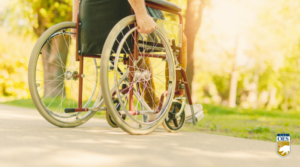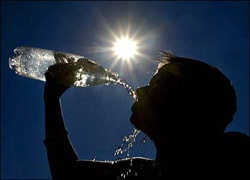The National Weather Service defines a heat event is as a forecast with a high risk for heat illness and fire danger across California.
The California Governor’s Office of Emergency Services (Cal OES) reminds you the importance of being prepared and to remember that some communities at a higher risk for heat illness like people with disabilities, older adults and children.

STAY COOL
Visit a local cooling center, a library, community center, or shopping center, take cool showers or baths and wear lightweight, loose-fitting clothing.

CREATE A SUPPORT NETWORK
Identify individuals in your life such as family, friends, and neighbors, who could help support you and check in on you during heat events.
Remember, creating an emergency preparedness plan based on your personal needs is critical to ensure you and your loved ones remain safe during an emergency.

SIGN UP FOR ALERTS AND NOTIFICATIONS
Sign up for emergency alerts with your county or local officials. You can choose how to get alerts sent to you when you sign up, including cell phone, home phone, email, text messages, and in some cases, TTY devices. And also, sign up for a medical baseline program, an assistance program for people who depend on power for certain medical needs.
STAY HYDRATED:
- Drink plenty of fluids, even if you don’t feel thirsty.
- Avoid drinks with caffeine or alcohol, which can dehydrate you.
- Consider sports drinks to replenish electrolytes.

CHECK ON OTHERS
Check on elderly neighbors, those with health conditions, and young children. Make sure they have access to cool spaces and are staying hydrated.
HEAT ILLINESS SYMPTOMS
- Familiarize yourself with symptoms of heat exhaustion and heat stroke.
- Know how to respond to these illnesses.
CALIFORNIA TAKES ACTION TO PROTECT VULNERABLE COMMUNITIES
As temperatures rise, Governor Gavin Newsom is also reminding Californians to use CalHeatScore, the state’s new extreme heat early warning system, to prepare, stay informed and stay safe.

Cal Heat Score
Developed by the California Environmental Protection Agency’s Office of Environmental Health Hazard Assessment (OEHHA) and launched this year, CalHeatScore provides locally tailored guidance to help reduce heat-related illness and save lives.
CalHeatScore also links to practical resources, including cooling centers, so people can prepare before dangerous conditions set in.
